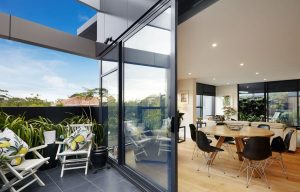You may think that glass is glass, but the truth is that no one type of glazing is suitable for every application. This is why we take a special interest in the window and door glazing here at Audsley Windows and have many different types of glazing options available.
Laminated Glass
Also known as safety glass, laminated glass incorporates a PVB layer between two pieces of glass to increase strength and also stop glass from falling out if it’s broken. Like the glass in windshields, the laminated glass may crack on impact, but the fragments tend to adhere to the protective layer rather than fall and potentially cause injury.
The interlayer cuts out 99% of UV rays, protecting you and your internal finishes and furniture from damaging UV rays. Laminated glass is also effective for sound control and provides resistance to penetration when subjected to attempted forced entry.
Double Glazing
Consists of two panes of glass with a gap in between. Optimising the distance between the panels provides great thermal or sound insulation benefits. We assess each project, based on your requirements to give you the most efficient glazing solution for your budget. Double glazed windows and doors are architectural elements designed with two glass layers that help maintain consistent indoor temperatures. Audsley Windows’ double glazing comes standard filled with Argon gas for increased thermal performance. Double glazed windows and doors are building components featuring two layers of glass with a sealed gap in between, which serves as an effective barrier against external temperature fluctuations and reduces sound transmission from the outside environment.
Toughened Glass
Toughened glass is stronger and has higher compressive stress than annealed glass of the same thickness. This means that it is more resistant to impact breakage, and is able to withstand uniform loads better. It also decreases the risk of thermal stress breakage. If it is broken, it shatters into small fragments, thus preventing major injuries.
Toughened glass may be heat-treated or chemically strengthened. Toughened glass is necessary for areas that have a high risk of human impacts such as glazed doors, bathrooms, and windows over 1.5m tall. Toughened glass, commonly used in double glazed windows and doors, undergoes a special heating and cooling process to increase its strength and durability, making it more resistant to shattering upon impact.
Toughened Laminated Glass
Provides the best of laminated and toughened glass products. It is capable of withstanding very large loads and in the unlikely event of being broken the resulting fragments will be retained by the interlayer. When properly glazed, it will normally remain in place until a replacement is convenient. The strength of toughened laminated glass makes it ideal for use as balustrades and barriers, overhead canopies, glass floors, fins and bomb blast resistance.
Float Glass
Audsley Windows does not use float glass due to the dangerous nature of how it breaks into large, sharp shards.
Low E Coatings
Audsley Windows offers several Low E products, all designed to increase thermal performance. Low E glass has a coating that allows daylight from the sun to pass into the house but reduces the amount of the long-wavelength infrared heat that can escape through the window. Low E glass has a coating that reduces the amount of solar heat gain while still maintaining good levels of visible light transmission.
For all your window or glazing enquiries in the Melbourne region or wider Victoria, be sure to get in touch with the team of specialists at Audsley Windows today on 03 9543 3911, or contact us online here.


























